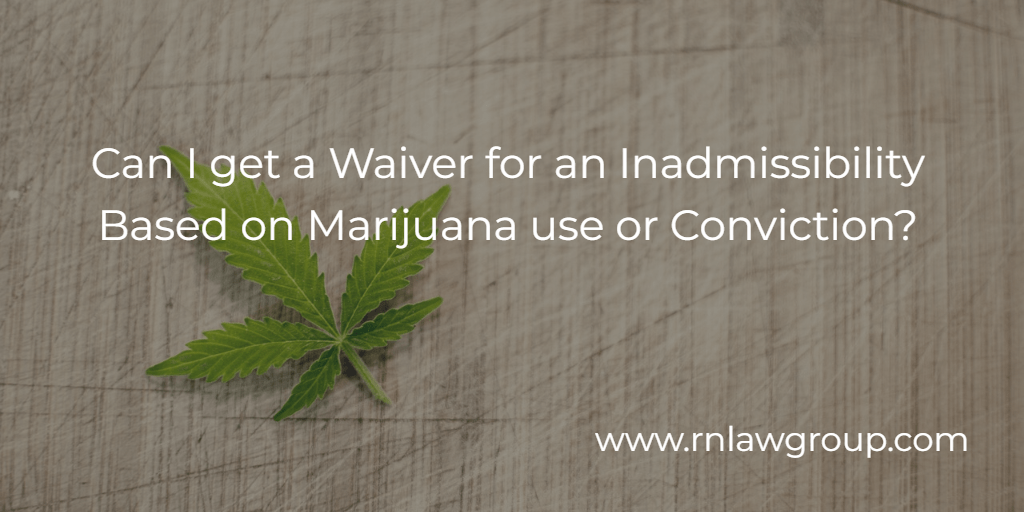
Can I get a Waiver for an Inadmissibility Based on Marijuana use or Conviction?
INA § 212(a)(2) lists various grounds of inadmissibility due to “criminal and related grounds.” The list of inadmissibility under this section include crimes involving moral turpitude (other than a purely political offense), violations of any law or regulation of a State, the United States, or a foreign country relating to a controlled substance, multiple criminal convictions, controlled substance traffickers, prostitution and commercialized vice crimes, and certain serious criminal activity who in which the individual was answered immunity from criminal prosecution. This article is going to focus on controlled substance law violations, and potential options for those that are deemed inadmissible due to an inadmissibility due to that ground.
In recent years, more and more issues have come up for immigrants and non-immigrants due to marijuana use and marijuana crimes. This has been due to the fact that various states have fully legalized marijuana use, partially legalized some marijuana use, or decriminalized or not pursuing criminal charges for marijuana use. Unfortunately, this creates massive confusion for non-citizens as marijuana is still a Schedule I substance under the Controlled Substance Act. This means, that non-citizens who use marijuana, or are arrested for marijuana related crimes, could be deemed inadmissible under INA § 212(a)(2). Notably, INA § 212(a)(2) does not specifically require a conviction of a marijuana related offense. INA §212(a)(2)(A)(i) explicitly mentions that an individual can be found inadmissible even if they admit to committing, admits to committing acts which constitute essential elements of the crime, or is involved in a conspiracy or attempt to violate “any law or regulation of a State, the United States, or a foreign country relating to a controlled substance.” This means that if you admit to the police officer that you had marijuana So what can you do if you are inadmissible or may be inadmissible due to a violation of INA § 212(a)(2)?
The first part of the “what can you do” answer will depend on your immigration status or what type of immigration benefit you are seeking as the answer will be different for non-immigrants vs. immigrant visa applicants. Let’s start with immigrant visas, and enter INA § 212(h). INA § 212(h) The INA 212(h) waiver is a type of waiver that allows a non-citizen to apply for a green card (lawful permanent residence) even if they have certain grounds of inadmissibility, such as a criminal conviction or controlled substance use. To be eligible for an INA § 212(h) waiver, the non-citizen must show that their criminal conviction or controlled substance use, or admission to the essential elements of the crime, was related to a single offense of simple possession of 30 grams or less of marijuana and that they meet certain other requirements. The INA has a hard cap on 30 grams, and that is not waivable. The other requirements include:
- The non-citizen must be the spouse, parent, son, or daughter of a U.S. citizen or lawful permanent resident.
- The non-citizen must demonstrate that their U.S. citizen or lawful permanent resident spouse, parent, son, or daughter would suffer extreme hardship if the non-citizen were not allowed to enter or remain in the United States. Examples of previous findings of extreme hardship can be found: https://www.rnlawgroup.com/unlawful-presence-waiver-for-immigrant-visa-applicants/
There are several steps involved in obtaining an INA 212(h) waiver:
- Determine if you are eligible for an INA 212(h) waiver: To be eligible for an INA 212(h) waiver, you must be the spouse, parent, son, or daughter of a U.S. citizen or lawful permanent resident and you must demonstrate that your U.S. citizen or lawful permanent resident spouse, parent, son, or daughter would suffer extreme hardship if you were not allowed to enter or remain in the United States.
- Gather supporting documentation: In order to apply for an INA 212(h) waiver, you will need to provide supporting documentation that demonstrates your eligibility for the waiver. This may include documents such as a birth certificate, marriage certificate, or proof of your U.S. citizen or lawful permanent resident spouse, parent, son, or daughter’s relationship to you. You will also need to provide documentation that demonstrates the extreme hardship that your U.S. citizen or lawful permanent resident spouse, parent, son, or daughter would suffer if you were not allowed to enter or remain in the United States.
- File Form I-601, Application for Waiver of Grounds of Inadmissibility: To apply for an INA 212(h) waiver, you will need to complete and submit Form I-601, Application for Waiver of Grounds of Inadmissibility, along with the required supporting documentation. You will also need to pay a filing fee
- Wait for a decision: After you submit your application for an INA 212(h) waiver, it will be reviewed by U.S. Citizenship and Immigration Services (USCIS). If your application is approved, you will be allowed to apply for a green card. If your application is denied, you may have the option to appeal the decision or to reapply with additional documentation or information.
While an INA 212(h) waiver is available for immigrant visa applicants, the Foreign Affairs Manual (FAM) confirms at 9 FAM 302.4-2(D)(2) that a Hranka waiver under INA § 212(d)(3) is available for non-immigrant visa applicants. As noted in the FAM, the adjudication of the waiver will focus on three factors:
- The recency and seriousness of the activity or condition causing the applicant’s ineligibility;
- The reason for the proposed travel to the United States;
- The positive or negative effect, if any, of the planned travel on U.S. public interests.
More on the Hranka waiver can be found here: https://www.rnlawgroup.com/the-nonimmigrant-waiver/
Again, it is important to emphasize that an INA § 212(h) waiver is only available for immigrant visa applicants, and non-immigrants must apply through an INA § 212(d)(3) waiver.
It is important to note that the process of obtaining an INA § 212(h) waiver or an INA §212(d)(3) waiver is complex and can be difficult to navigate without the assistance of an immigration attorney. A qualified immigration attorney can help you gather the necessary documentation, complete the required forms, and represent you throughout the application process.
Reddy & Neumann has been serving the business community for over 20 years and is Houston’s largest immigration law firm focused solely on US. Employment-based immigration. We work with both employers and their employees, helping them navigate the immigration process quickly and cost-effectively.
By: Steven Brown
Steven Brown is a Partner at Reddy Neumann Brown PC where he works in the Non-immigrant visa department and leads the Litigation Team. His practice covers all phases of the non-immigration visa process including filing H-1B, L-1, E-3, H-4, and H-4 EAD petitions. In the last two years, Steven has successfully handled over 1,000 non-immigrant visa petitions including filing petitions, responding to any necessary Requests for Evidence, and drafting motions and appeals. He has also become a key resource for F-1 students that seek guidance on properly complying with the F-1 visa regulations and any OPT or CPT issues they may have. Additionally, Steven holds a weekly conference call for companies that are part of one of the largest organizations for IT Services companies in America.

